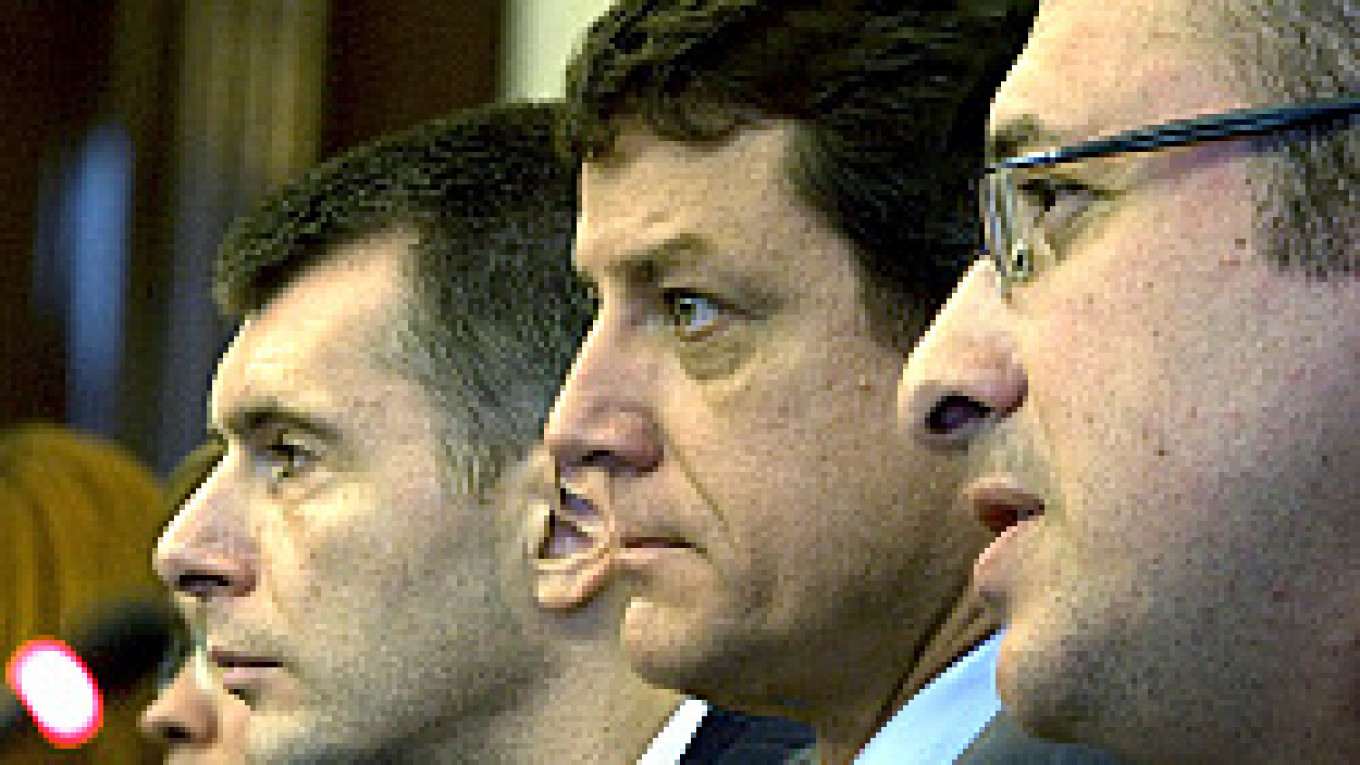Stephen Jennings, chief executive of Renaissance Group, RenCap's parent company, denied that the move was a rescue package, describing it instead as a pre-emptive strike aimed at avoiding the collapses and U.S. government-backed rescue deals that have humbled once-mighty Wall Street banks in recent months.
"Rather than get into a situation where we have to react, we have decided to act proactively," Jennings said after a news conference at Moscow's Ritz Carlton, where the deal was announced.
Prokhorov's cash-rich Onexim Group will receive a stake of 50 percent minus one share in Renaissance Capital and appoint three members to its board of directors. Prokhorov said he did not rule out joining the board.
The deal valued Renaissance Capital at far less than it was worth in 2006, when Russian newspapers reported that VTB offered to buy the investment bank for $4 billion.
Prokhorov and Jennings said market turmoil, which saw Russia's bourses plunge over 20 percent last week before recovering on Friday on the back of a $130 billion government stimulus package, sped up a deal that they had been negotiating for about six months.
"The problems on the global market sped up our talks so that we came to a compromise and concluded a deal," Prokhorov said.
"Would it have been better to do the deal six months ago? Obviously," Jennings said after the news conference.
Jennings said the bank, which expects revenue of $400 million in 2008, was in a "very strong" financial position. "We don't own toxic bonds, we have no write-downs," he told the news conference.
Dmitry Razumov, Onexim's general director, said Prokhorov's holding was ready to extend a credit line to RenCap but declined to comment on when or how much.
The government has promised to inject over $130 billion worth of liquidity into the markets since last week, and late Sunday it expanded to 28 the number of banks that will have access to budget funding from the initial three listed ?€” state-linked VTB, Sberbank and Gazprombank.
Prokhorov, Russia's fifth-richest man according to Forbes, is sitting on piles of cash after selling a 25 percent stake in Norilsk Nickel in April as part of his split from former business partner Vladimir Potanin.
"I don't want to say that I'm Nostradamus," Prokhorov said. "In summer, several signs [of the liquidity crisis] were already in our faces. We prepared for it earlier."
Prokhorov's Onexim Group was one of the founding shareholders in RenCap, holding a 20 percent stake from 1995 to 1999. Onexim sold its stake in the wake of the 1998 financial crisis.
Analysts and insiders expect a radical shakeup of Russia's banking sector as second- and third-tier banks face severe limits in accessing liquidity. Brokerage KIT Finance said last week that it was close to selling a controlling stake to Gazprom-owned Leader Asset Management after being unable to meet its debt obligations.
"This crisis will lead to the bankruptcy of several banks. We can't close our eyes to this," Prokhorov said on Monday.
"The government wants to see a consolidation of the banking system," Jennings said, commenting after the news conference on the state's emergency funding package. "They're providing liquidity to the banks that should survive," he said, adding that some of the country's banks would fail.
Prokhorov and Jennings presented the deal as providing an opportunity to capitalize on the turbulence in global and Russian markets, allowing them to snap up key assets and talent as banks collapse. The cash injection would allow them to "grow aggressively and decisively," Jennings said, focusing on expansion in Africa, the Middle East and eventually the West.
"We're living through a very unusual crisis. People who are strong financially today have the ability to benefit ?€¦ at a time when not many competitors will have the resources to do so," Jennings said.
The deal is subject to regulatory approval.
A Message from The Moscow Times:
Dear readers,
We are facing unprecedented challenges. Russia's Prosecutor General's Office has designated The Moscow Times as an "undesirable" organization, criminalizing our work and putting our staff at risk of prosecution. This follows our earlier unjust labeling as a "foreign agent."
These actions are direct attempts to silence independent journalism in Russia. The authorities claim our work "discredits the decisions of the Russian leadership." We see things differently: we strive to provide accurate, unbiased reporting on Russia.
We, the journalists of The Moscow Times, refuse to be silenced. But to continue our work, we need your help.
Your support, no matter how small, makes a world of difference. If you can, please support us monthly starting from just $2. It's quick to set up, and every contribution makes a significant impact.
By supporting The Moscow Times, you're defending open, independent journalism in the face of repression. Thank you for standing with us.
Remind me later.


